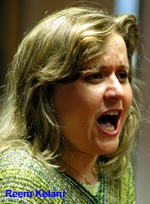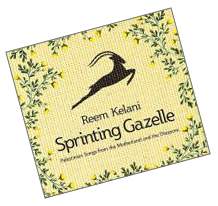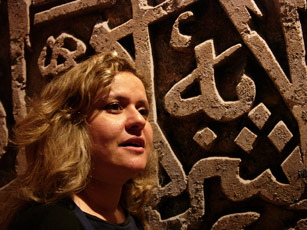
APRIL2006

 Reem Kelani: Sprinting Gazelle
Reem Kelani: Sprinting Gazelle
Palestinian Songs from the Motherland and the Diaspora.
[Fuse Records CFCD048]
Reem Kelani was born in Manchester in the UK to
Palestinian parents, and brought up in Kuwait. Although
she is a vastly experienced singer, musicologist,
broadcaster and pedagogue, and featured on two
spectacular tracks of Gilad Atzmon's Exile album, this is
her debut CD.
Five of the ten listed tracks on Sprinting Gazelle are
traditional Palestinian songs which Kelani learned from
older women in the Galilee and in the refugee camps in
Lebanon and which she has arranged for this album
imaginatively and colourfully, with a certain jazz
inflection (her band is construction around a Jazz rhythm
section of piano, doube-bass and drums). The other five
tracks are original compositions with words by the likes
of Salma Jayyusi, Mahmoud Salim Al-Hout, and the
"Arab poet laureate" Mahmoud Darwish. Darwish
also provides the epigraph to the album: "I defend
the right to defend my right."
Anybody who has attended one of Reem Kelani's
electrifying live performances will know that she shuns
political rhetoric, preferring to allow the music to
speak for itself - of exile, yearning, injustice, and
sumud (steadfastness). Nonetheless, the very fact that
she is Palestinian seems to have proved embarrassing for
some politically craven radio hosts in the UK, who have
presented her as "a Kuwaiti singer." A
particularly imbecilic review on the BBC website, by one
Jon Lusk, fails to mention her provenance, while claiming
that "the mood is mostly pretty bleak and
melancholic, given the origin of the material", a
connection he demurely fails to explain.
"Don't listen to it all at once!" advises Lusk.
For my part, I listened to it three times in succession
with an increasing sense of exhilaration. Of course much
of the material is melancholic, but much is not, and some
is downright euphoric - particularly the final listed
track Il-Hamdillah (Giving Praise). This closed Kelani's
Dublin concert in 2005, and brought the entire audience
to the floor in one of the clumsiest but most
enthusiastic displays of dabkeh dancing ever seen...
Kelani's multinational cast of backing musicians includes
Zoe Rahman on Piano, Idris Rahman on clarinets and sax,
Samy Bishai on violin (almost unbearably haunting in No.
6, Yearning), Patrick Illingworth on drums, Fariborz
Kiani on percussion, Oli Hayhurst on bass, with Tigran
Aleksanyan and Dirk Campbell on, respectively, yarghul (a
Palestinian double clarinet) and nay (an end-blown
flute; two are involved, one Iranian and one Arabic).
Kelani provides scholarly liner notes and a comprehensive
glossary for this handsomely-produced album, and all
texts are included in Arabic with English translations.
Sprinting Gazelle is a labour of love; I believe it's a
masterpiece.
Raymond DeaneŠ
* * * * * * *
"Rarely has the entire tragedy of a people been
condensed into artful melodrama by such a powerful and
stirring voice. Her range extends from the deepest lows
to the brightest highs, in between which she launches
herself unselfconsciously into unending notes, enriching
melodies with slides and glissandos."
Frankfurter Allgemeine Zeitung, Germany, May 2003
Norbert Krampf
Translated from German
* * * * * * *
She doesn’t sing the music, but lives it with
her whole body and soul. The sheer emotional power of it
hits you right in the solar plexus, but it’s totally
controlled –
she can switch instantly from anger to laughter, from
grief to celebration
Roger van Schaick
Oxford Times

Songs of Pain and Pride
Burj el-Barajneh Dispatch
written by Reem Kelani
Published in The Middle East Report Spring 1999
www.merip.org
After making my way through the rubble and squalor of the overcrowded refugee camp near Beirut's International Airport, I arrived half an hour late for my appointment with Umm Muhammad, a local living repository of Palestinian folk song traditions.
Umm Muhammad, or as she pronounced her name in the northern Palestinian dialect, "Im Imhimmad," warmly welcomed me into her spotless, tiny apartment.
It was 'Id al-Fitr (the feast concluding Ramadan), and the air was spiced with the scents of Arabic coffee and freshly baked date cakes. Umm Muhammad led me into a cozy room, where we began our interview.
At first I had trouble hearing her over the squawking of a television blaring Arabic "video clip" pop songs, dubbed Mexican soap operas and annoying foreign advertisements.
Umm Muhammad looked askance at my tape recorder as she began recounting Palestinian musical traditions. When I asked her to sing a song from Palestine, the floodgates opened. "I want to sing you some 'ataaba," she said. 'Ataaba is a form of improvised colloquial sung poetry that has existed for centuries in Greater Syria and Mesopotamia.
"Which theme of 'ataaba would you like to sing, mother?" I asked. "Furaqiyyat, my girl." She referred to a genre of songs that convey nostalgia and sorrow over the loss of loved ones.
Umm Muhammad's voice was very strong for a woman in her late seventies; it expressed a depth of passion that no formal music training could have provided. The earnest huskiness of her voice brought to life the land and the people about which she sang. Clearly, I was in the presence of a fine exponent of musical tradition.
During intermissions between songs, Umm Muhammad discussed politics openly. "They sold us for pennies," she complained, referring to Palestinian and Arab leaders.
When I asked her to be careful of what she said on tape, for her safety, she defiantly retorted: "'Ala teezi [my ass]! Let them kill me if they wish! I fear no one!"
When questioned about the fate of the Palestinian refugees in Lebanon, Umm Muhammad's answer conveyed a deep and bitter weariness.
"No one wants to know. They might as well put us all in one huge container and get rid of us with one shove, instead of this slow death." The "container" analogy brought to mind horrific images of European Jews during the 1930s and 1940s. No sooner had I thought this, than she beat me to it by adding, "I lost my husband and a son in two wars. Why did they make us pay the price for World War II?"
She showed no self-pity, however, only surprise and puzzlement. She was ready to forget the misery of the 350,000 or so Palestinian refugees in Lebanon for the sake of one stone-throwing youth in the West Bank.
"Forget about the Palestinians here in Lebanon; our fate was sealed long ago. But I watch these brave young men on television and I pray for them."
I asked Umm Muhammad about the "right of return," and she told me that she had actually "returned" once to her birthplace, Acre ('Akka, in Arabic). "I went back to 'Akka two years ago," she recounted. "A relative of mine got a permit for me to visit. Would you believe it?! I needed a permit to visit my own homeland!" Curious, yet apprehensive, I asked her how she found it. Umm Muhammad's eyes sparked.
"I left my cousins young, and now they are old. Women my age use crutches over there, not like your Umm Muhammad here! I even managed to do the sword dance at a wedding in 'Akka!"
"Did you kill anyone with your sword?" I inquired cheekily. "Kill anyone? Of course not! The dancing area in the village was so big, I couldn't have reached anyone with my sword even if I had wanted to. I danced to a famous song."
I asked what song and she grabbed the tape recorder and launched into a well-known song style that accompanies a traditional dance called sahjeh. This dance features two lines of men standing opposite each other (called sahhaajeh), clapping their tilted hands in unison towards the floor. Sometimes, a woman, or a group of women, dances between the lines of men, holding a sword or a dagger.
The main song is usually performed by at least one lead singer (Hadda' or Hadi). The rest of the participants act as chorus, singing a refrain: "Ya halali ya mali…. Ya halali ha mali," meaning "what I have is mine by right."
As I said goodbye to Umm Muhammad and her family, the call to afternoon prayer (adhaan) wafted over the confined space of the camp, blending harmoniously in my ears with the last, stirring verse that Umm Muhammad had sung. It made me realize that we Palestinians had indeed once lived on our land. I also realized, as I left the entrance of the dismal camp, that we had not safeguarded that land, that halal.
People like Umm Muhammad make me believe in the possibility of regaining our halal.
"Ya halali ya mali… Ya halali ya mali…"
Reem KelaniŠ, a Palestinian musician and singer